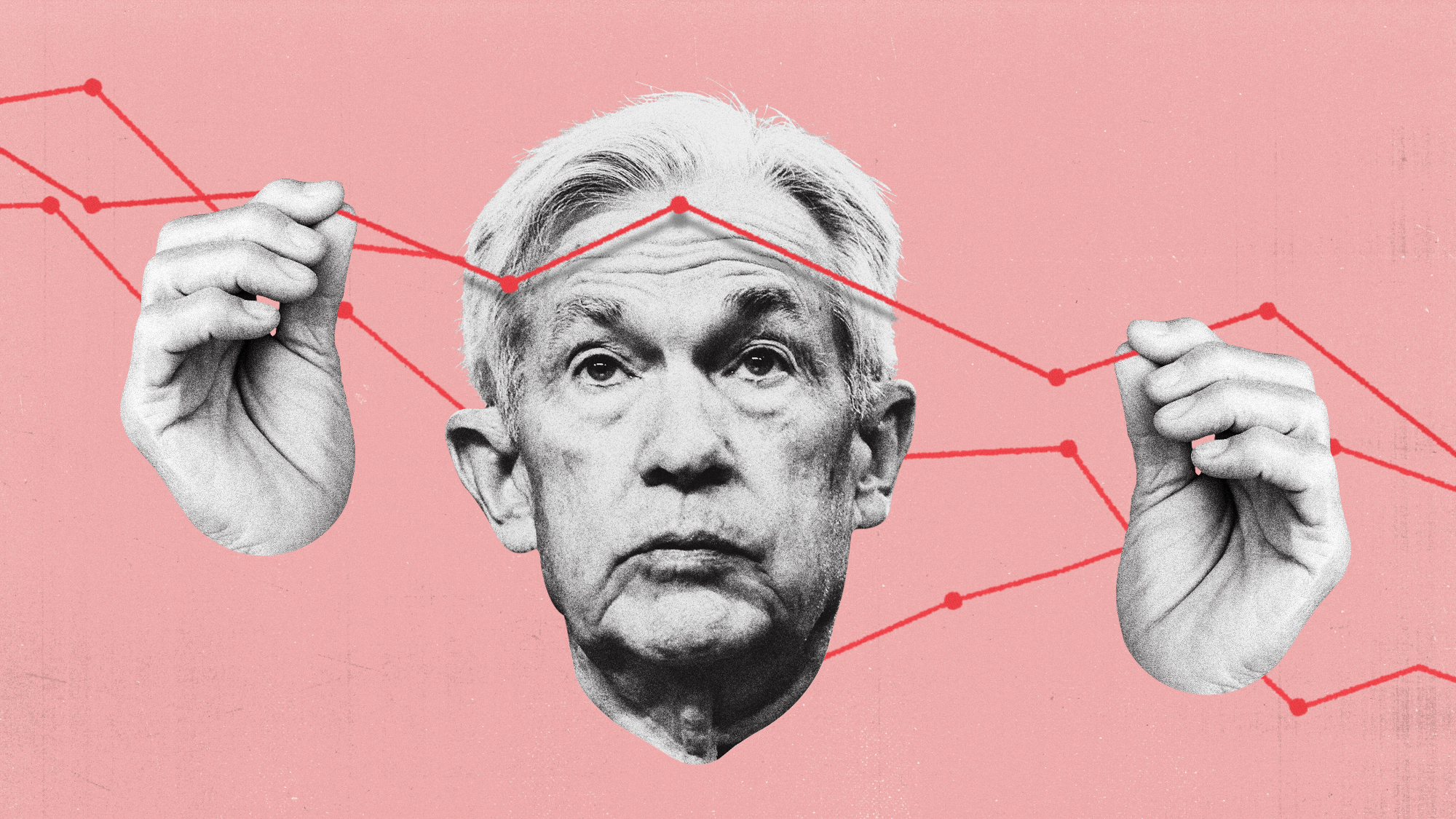What's the Federal Reserve's new instant payment system, FedNow, and will it kill Venmo?
The Fed's new financial tool may will make your life easier and your money more portable


A free daily email with the biggest news stories of the day – and the best features from TheWeek.com
You are now subscribed
Your newsletter sign-up was successful
The Federal Reserve launched a new instant payment system, FedNow, on July 20. It promises to open the world of instantaneous money transfers, at any hour of any day, to the masses — at least in the U.S.
First announced in 2019, FedNow is an opt-in service offered to credit unions and banks, not directly to consumers. But "over time, as more banks choose to use this new tool, the benefits to individuals and businesses will include enabling a person to immediately receive a paycheck or a company to instantly access funds when an invoice is paid," Fed Chairman Jerome Powell said in a statement announcing that FedNow has gone live.
Here's a look at how FedNow works, what it will do and why you might want to be paying attention.
The Week
Escape your echo chamber. Get the facts behind the news, plus analysis from multiple perspectives.

Sign up for The Week's Free Newsletters
From our morning news briefing to a weekly Good News Newsletter, get the best of The Week delivered directly to your inbox.
From our morning news briefing to a weekly Good News Newsletter, get the best of The Week delivered directly to your inbox.
What exactly is FedNow?
With FedNow, the Federal Reserve has essentially updated its "financial plumbing," creating a "new piece of infrastructure that participating financial institutions can use to transfer money instantly among themselves," Tory Newmyer explained at The Washington Post. Right now, consumers can wait days for a check or bill payment to clear, especially if weekends and holidays are involved.
The Fed is offering the system to financial institutions, and the banks and credit unions that opt in can turn around and provide services that will allow their customers — businesses and individuals — to send payments instantly. FedNow will only work between two participating banks. Upon launch, the Fed said, "35 early-adopting banks and credit unions, as well as the U.S. Department of the Treasury's Bureau of the Fiscal Service, are ready with instant payments capabilities" via FedNow.
How does it work?
Payments between banks usually involve clearing — exchanging information about a payment, including potential fraud — and settlement, where the money is moved from the sender's account to the recipient's, Spencer Tierney said at NerdWallet. "FedNow will make clearing and settlement occur within seconds."
You may think of the Federal Reserve mainly as the institution that determines interest rates and, thus, mortgages and savings account interest, but it has also been facilitating inter-bank money transfers for more than a century.
A free daily email with the biggest news stories of the day – and the best features from TheWeek.com

The Fed envisions FedNow as a tool that banks and credit unions can use in innovative and creative ways to facilitate real-time payments. The system will be rolled out in stages. This first phase will "provide baseline functionality" for things like account-to-account transfers and bill pay, the Fed said.
Is the Fed gunning for Venmo and PayPal?
The Federal Reserve isn't offering a service to rival popular person-to-person payment services like Venmo, PayPal, Zelle and Cash App. But your bank might eventually. While FedNow doesn't, and won't, have an app or website people can use to send money to a friend or business, the Fed "expects that as the system is developed further, it will be integrated into the apps and websites of banks and credit unions," CNBC reported.
Venmo and PayPal offer the appearance of instant payments among users, "but to pull money off one of those platforms and back into a bank account, users have to go through the same old financial pipes that can take days to process," the Post's Newmyer noted. That time lapse is also true of Zelle, which incidentally only "works with some financial institutions while FedNow is backed by the Federal Reserve and is envisioned to be adopted by the majority of banks in the country," The Associated Press said.
The more direct competitor to FedNow is Real-Time Payments (RTP), an instant payment system started in 2017 and run by the privately owned Clearing House. About 350 financial institutions have joined the RTP network, including many of the larger banks, and more than 150,000 businesses use it to send payments. That's still a fraction of the 10,000 U.S. banks and credit unions already served by the Fed, NerdWallet's Tierney said, and FedNow will "likely expand the reach of instant payments to more institutions nationwide."
In the meantime, it's "not yet obvious" that having two instant payment networks is "better than one, especially given that the two systems are not interoperable," Axios argued.
How might FedNow be used in real life?
The Federal Reserve suggests the "substantial benefits" of FedNow include that "individuals can instantly receive their paychecks and use them the same day." If you forgot to pay your rent or utility bills until the last minute, the AP added, "you will be able to send the money late at night without waiting to have it cleared the next business day."
Banks could also use FedNow to offer a centralized tool for automated payments of rent, bills, prescriptions or other recurring expenditures, analysts told the Post. "Backers of the system hope wider availability of instant payments will help Americans avoid overdraft and late fees," as well as usurious check-cashing services, all of which "present an especially heavy burden to those with lower incomes," the Post said.
There would be virtually "no risk of overdrawing your bank account" with FedNow because "your bank has to verify sufficient funds before initiating an instant payment," Tierney explained at NerdWallet. "Instant account-to-account transfers would allow you to manage your accounts across banks easily."
Will FedNow cost anything to use?
"As with other Fed payment services, FedNow will charge fees to its participating financial institutions," Tierney said. But banks haven't said if they will pass those costs on to customers.
Will your bank sign up?
Probably, eventually. The 35 early adopters already include some of the U.S.'s largest banks, including JPMorgan Chase and Wells Fargo. "Some experts expect it to take years for FedNow to gain widespread industry participation, a characterization the Fed does not dispute," the Post reported. But banks could well face pressure to ante up, said Darrin Peller, an analyst at Wolfe Research. "Within the next five years, if you want to be in financial services in the U.S., you'll have to offer real-time payments, or you'll be left behind."
The participation of the Treasury's Bureau of Fiscal Service might create some urgency for on-the-fence financial institutions, payment industry consultant Peter Tapling told NerdWallet. That department issues tax refunds, Social Security benefits and other government payments to the public. If your bank or credit union is slow to adopt, you can always exert pressure yourself.
After all, the Fed isn't breaking new ground here. England has had its own instant payment system since 2008, and China, India, Sweden and other countries have also bested the U.S. in real-time payments. "FedNow is like buying an iPhone 1 and marveling at the power of a smartphone," Aaron Klein, a senior fellow at the Brookings Institution, told the Post.
Peter has worked as a news and culture writer and editor at The Week since the site's launch in 2008. He covers politics, world affairs, religion and cultural currents. His journalism career began as a copy editor at a financial newswire and has included editorial positions at The New York Times Magazine, Facts on File, and Oregon State University.
-
 The world’s most romantic hotels
The world’s most romantic hotelsThe Week Recommends Treetop hideaways, secluded villas and a woodland cabin – perfect settings for Valentine’s Day
-
 Democrats push for ICE accountability
Democrats push for ICE accountabilityFeature U.S. citizens shot and violently detained by immigration agents testify at Capitol Hill hearing
-
 The price of sporting glory
The price of sporting gloryFeature The Milan-Cortina Winter Olympics kicked off this week. Will Italy regret playing host?
-
 Powell: The Fed’s last hope?
Powell: The Fed’s last hope?Feature Federal Reserve Chairman Jerome Powell fights back against President Trump's claims
-
 The end for central bank independence?
The end for central bank independence?The Explainer Trump’s war on the US Federal Reserve comes at a moment of global weakening in central bank authority
-
 Who will be the next Fed chair?
Who will be the next Fed chair?Today's Big Question Kevin Hassett appears to be Trump’s pick
-
 Fed cuts interest rates a quarter point
Fed cuts interest rates a quarter pointSpeed Read ‘The cut suggests a broader shift toward concern about cracks forming in the job market’
-
 Trump's threats to fire Jerome Powell are unsettling the markets
Trump's threats to fire Jerome Powell are unsettling the marketsTalking Points Expect a 'period of volatility' if he follows through
-
 How will Wall Street react to the Trump-Powell showdown?
How will Wall Street react to the Trump-Powell showdown?Today's Big Question 'Market turmoil' seems likely
-
 How will the Fed manage Trump's economy?
How will the Fed manage Trump's economy?Today's Big Question Jerome Powell is 'in a bind'
-
 Fed cuts rates half a point, hinting victory on inflation
Fed cuts rates half a point, hinting victory on inflationSpeed Read This is the Fed's first cut in two years
